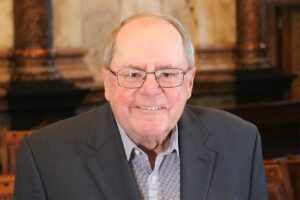Interview of George Teagarden, October 28, 2022
Interviewed by Duane Goossen and Joan Wagnon
This interview with George Teagarden covers the 14 years he spent in the House of Representatives, mostly serving on the Ways and Means/Appropriations committee. Teagarden describes the committee whose job was to work the state budget every year. In the early years it was characterized by cooperation and working together on issues regardless of party. He notes that cooperation was changing as he left and becoming much more partisan. The use of provisos often bypassed the traditional legislative route for policy-making. He followed his legislative service by working 16 years as Kansas Livestock Show MoreCommissioner. The livestock industry had appointed him to that job, but it is now a gubernatorial appointment. Show Less



